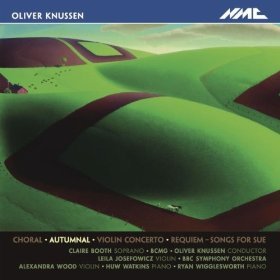Say what you like about America, but it certainly knows how to turn out an opera diva. While the Russians and even Italians can be chilly and untouchable in their splendour, there’s a cultivated ease with the likes of Renée Fleming and Joyce DiDonato that allows a song recital to be both a relaxed conversation with an old friend and a piece of highly crafted technical showmanship. It’s artifice and artistry of the highest order – not just making it all look easy, but showing us just enough mechanics to prove that it definitely isn’t.

What if Handel, after his death, descended to an eminently civilised afterlife, where he spent his time making music and new friends with the likes of Beethoven and even Jimi Hendrix? That’s the premise of Louis de Bernières’ new play Mr Handel, a show that brings the author himself together with baroque chamber group The Brook Street Band and soprano Nicki Kennedy in a gentle meander through the life and works of baroque’s finest.

Her Majesty was making a rare concert-hall appearance to present the Queen’s Medal for Music, and any little Englanders in the audience might have been tempted to link royalty to Elgar’s Enigma Variations. But conductor Robin Ticciati, with a generosity and wisdom beyond his 29 years, raised this orchestral masterpiece to the universal level it deserves. Elgar’s "friends pictured within" trod air and revealed every aspect of their often shy, beautiful souls.

The billing for this all-Schubert concert, "Spira Mirabilis and Kate Royal", was a little misleading, since they did not actually share the stage at any point, the two halves being clearly separate events. First came the hour-long Octet, played by members of Spira Mirabilis, followed by half an hour of songs with Kate Royal accompanied by Malcolm Martineau.
Now the BBC Symphony Orchestra’s second Conductor Laureate, Jiří Bělohlávek was always going to deserve a hero’s welcome for taking his players to the finishing line of their six-year cycle through Mahler’s symphonies. As more superficially brilliant Mahler series like Gergiev’s, squeezed into a single anniversary season, seem a distant memory, many of Bělohlávek’s slow burn, deep vein interpretations live on in the mind and soul.

Arditti String Quartet, Wigmore Hall, 31 October ****
November is always a good month for new music. This year saw the interest begin a day earlier. Whichever wag chose to hand over Halloween at the Wigmore Hall to two of the most uncompromising contemporary string quartets, however, was denied a fitting punchline. The young JACK Quartet were grounded in New York by Sandy, and the venerable Ardittis chose to programme works that weren't half as terrifying as hoped.


Any young composer who finds himself at the opposite end of a programme from Walton’s First Symphony had better be good. Edward Nesbit - whose piece Parallels was commissioned by the LSO Panufnik Young Composer’s Scheme - is certainly that. Indeed the aggressive brass punctuations and nerve-wracking silences that helped point up the symmetry of his very accomplished diptych might have been designed to complement the Walton - or indeed Beethoven’s Fourth Piano Concerto - where silence is not just golden but potent, too.

Leonidas Kavakos was originally meant to be premiering a concerto by Argentinian composer Oswaldo Golijov, which had also been scheduled for Berlin in 2011 and subsequently for Los Angeles in May this year. The composer missed both those deadlines and the work apparently remains uncompleted – it was replaced on the programme by the Berg concerto.

There are always risks involved in the uncompromising side of the BBC Symphony Orchestra’s family-friendly concerts. Succulent slices of fox-meat in the form of a suite from Janáček’s The Cunning Little Vixen gave the kids a nourishing start, and Rimsky-Korsakov’s Scheherazade was always going to seduce them with her effervescent narrative, especially given Czech conductor Jakub Hrůša’s youthful instincts to paint big, bold pictures.

